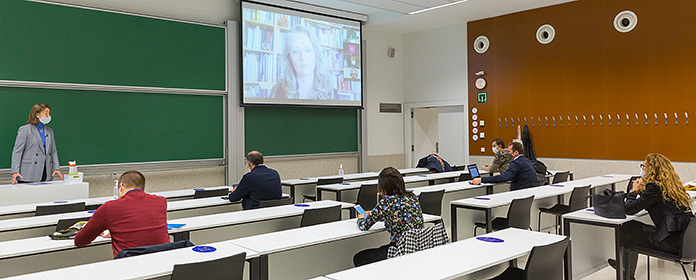"We need to redefine what it means to be humanists in the 21st century because we are involved in the technological transformation of the contemporary world".
Nuria Rodríguez Ortega, president of the International Society of Humanities Hispanic Digital Society (HDH), gives a session at the University of Madrid

"We need a redefinition of what it is to be humanists in the 21st century, because we are directly involved in the technological transformation of the contemporary world. This means new opportunities for humanists to become relevant actors in the configuration of a hyper-technologized world". This was stated by Nuria Rodríguez Ortega, president of the International Society of Hispanic Digital Humanities (HDH), at the University of Navarra. The professor of Art History at the University of Malaga has participated as the main speaker in the workshop "Humanists in the digital age", organized by the School of Philosophy and Letters of the University of Navarra in partnership with the HDH. The goal of the meeting, which was attended by more than 70 people from various institutions and countries, has been to officially present the laboratory of Humanities Digital of the academic center, launched a few months ago.
As Rodriguez Ortega pointed out, "little by little, the Humanities Digital are being considered in Spain and undertaking institutionalization processes such as this laboratory presented today by the University of Navarra". In this sense, he assured that it is important to consider "what are the Humanities necessary to confront the problems of the contemporary world and respond to them". A world "technologically mediated and doomed to technodependence", according to the expert, which requires "a reflection on and from the technological" and Humanities "that aspire to be subject of their time and respond to the epistemic, sociocultural and political challenges of our contemporaneity, located in a framework of thought that addresses the relationship between subject, environment, technology, culture ...". "The Digital Humanities must be critical about the shaping of the technological world and be transformative," he said.
Faced with this "change of technoepistemic paradigm that defines our historical moment", the speaker has defended the need to reformulate the fundamental questions: "The Humanities Digitals provide a horizon of thought to approach the analysis and interpretation of the facts and cultural processes from a different perspective; we must be able to question reality from another perspective".
The workshop was chaired by Julia Pavón, dean of the School of Philosophy and Letters, who agreed with speaker when she said that "technological changes and innovations have reoriented our contact with cultural heritage, making it possible to access museums, repositories, collections, etc. at the click of a button". "These new models of knowledge dissemination of cultural heritage are here to stay as a learning tool, so entering into dialogue and connecting with heritage involves a deep self-reflection and this laboratory is born in that area," he added. He also explained that with this project "we not only want to provide technological, theoretical and methodological coverage to facilitate the learning of our students, but also to provide a forum for intellectual reflection and discussion".
For his part, Professor Juan José Pons, director of laboratory, said that this project "is a commitment to the multidisciplinarity, because the Humanities Digital are an opportunity to dialogue more and develop more cohesive lines of research , try to break down barriers between disciplines and allow to work together on issues that interest each other. This laboratory wants to be a space for everyone who wants to feel part of it". He also shared with the attendees the development plan of project and the four pillars on which it aspires to be based: training, research, relationship and knowledge dissemination.
To conclude the meeting, professors and researchers from different centers and Departments have presented six projects related to the Humanities Digital that are currently underway at the University and have shared their experiences.
